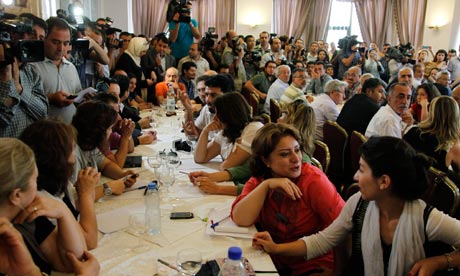Allowing opposition figures to meet openly was an attempt to show the world Syria is serious about reform – if only it were true.
By Fadwa al-Hatem

By Fadwa al-Hatem

Syrian opposition figures take part in a discussion about the future of their country in Damascus, 27 June 2011. Photograph: Khaled Al-Hariri/Reuters
The fact that the Syrian authorities have given the green light for leading opposition figures to meet openly may be unprecedented, but it is not the sign of progress that many might hope for. Congregating in a Damascus hotel, Syrian opposition figures that have long suffered under the auspices of this regime were on Monday permitted to meet to discuss – and, well, that's it.
The aim of the meeting was to establish a number of proposals to put forward to the regime that, if accepted, would hopefully resolve the crisis in the country and place Syria on the path towards becoming a democratic state with a flourishing civil society. That is a big "if", as the regime knows that any meaningful reform will spell the eventual end of a Syria dominated by the Assads and Alawites.
The timing of this conference, as well as the circumstances under which it has been held, are all suspect. Coming a week after President Bashar al-Assad's speech, the conference appears to be nothing more than part of a public relations exercise by a regime that is intent on showing the world it is serious about reform, but without actually being serious.
The government only allowed the meeting to include those opponents with no previous affiliations or who did not belong to any political parties. As a result, only a handful of those attending would be recognised by the average Syrian.
A draft statement of the meeting, which I have been able to see, makes several points that are not too bad, although the opening paragraph casts doubt on whether it is still possible to initiate or have any form of meaningful dialogue with the regime.
Most notably, the draft declaration from the conference recommends that the government allow a greater scope for political involvement by citizens, the leashing of the security services and an open space for the opposition and for Syrian intellectuals to engage with political life in Syria's state-dominated media.
The attendees at Monday's meeting also called for the scrapping of the ridiculous law of demonstrations that was passed at the start of the crisis; the repealing of article 69 exempting Syrian security personnel from accountability; and the repeal of the recently enacted decree 55, which is seen as far worse than the emergency law that was supposed to have been lifted at the start of the crisis. Finally, the declaration proposes a mechanism for implementing these reforms.
That is all well and good, but what on earth does this "internal" opposition, with all its good intentions, expect from a regime that still refuses to acknowledge that there is a problem? The president's speech on 20 June referred to the "germs of conspiracy" that were rife in Syria; the chasm between what the world, and many Syrians, now believe to be happening in the country and what the regime is prepared to acknowledge is so vast that it may be now be unbridgeable.
There are protests taking place throughout Syria almost daily, while the city of Hama is reported to be de facto without so much as a traffic policeman. As the Syrian dissident in exile, Ammar Abdulhamid, said, the Syrian revolution is not stillborn – it is a healthy baby that may form the "foundation of a future Syria".
Another issue that casts doubt on the credibility of this conference is the strange emphasis placed on the fact it was an "internal" opposition that met. One of those attending, the writer Nabil Saleh, questioned the objectives of the opposition in exile, even though there is no one group or one form of political thought that such a term can encompass. The different groups and individuals that form the "Syrian opposition" in exile can barely stand each other, let alone agree on sinister "objectives" for Syria.
Such bizarre statements might be seen as attempts to prevent aggravating an already paranoid and wounded regime, but they do not help in establishing the credentials for a venture that seemed to be doomed before it even started. The future of this country is being written on the streets of Syria's towns and cities, not in hotel conference rooms, whether Assad's regime likes it or not.
This commentary was published in The Guardian on 28/06/2011
No comments:
Post a Comment